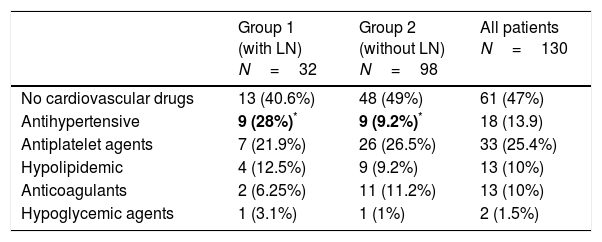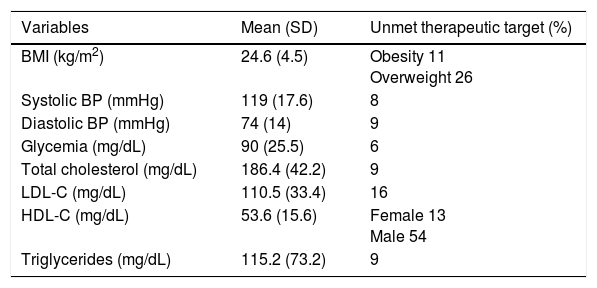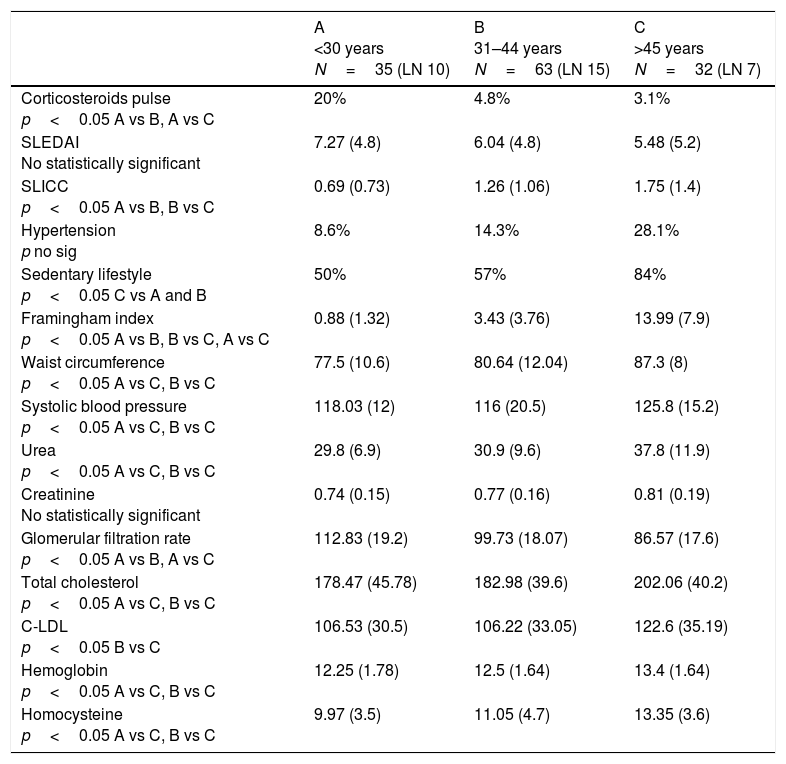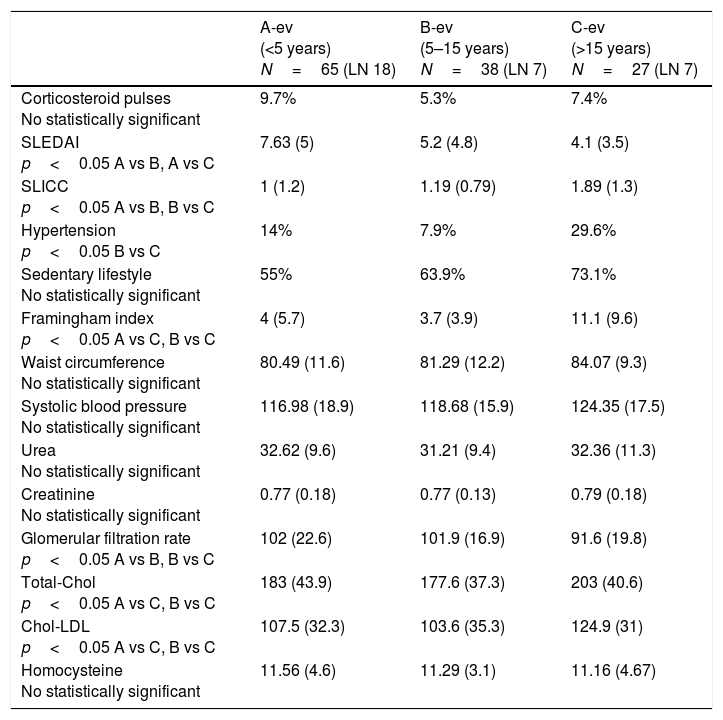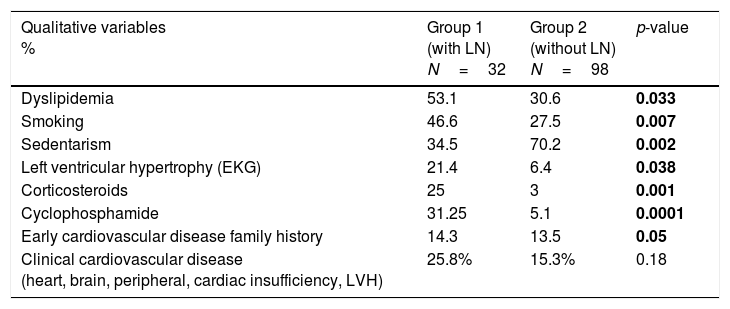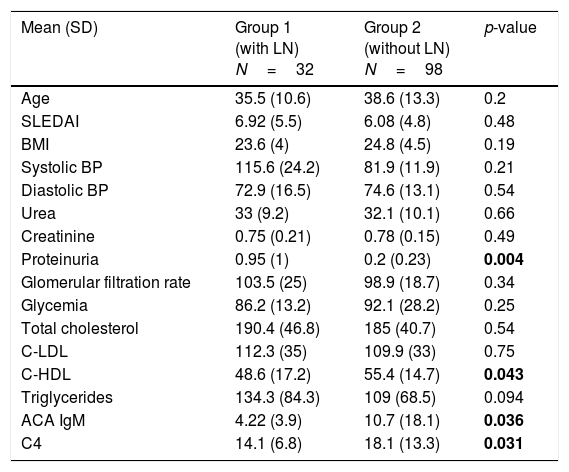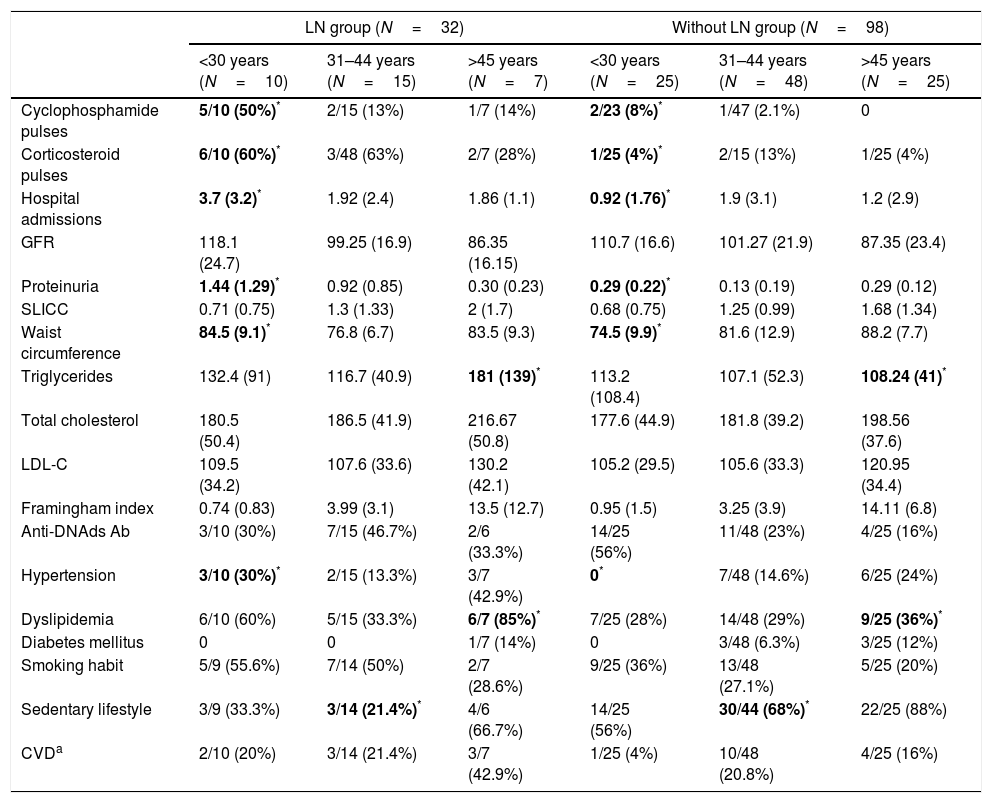Despite the improvement in the prognosis of lupus nephritis (LN), the cardiovascular morbimortality remains high. The early recognition and remission of flares, while trying to avoid the metabolic adverse effects of medication, must be mandatory.
AimThe aim of our study was to assess the cardiovascular (CV) risk profile in a cohort of lupus patients with preserved kidney function after a nephritis episode, compared to patients without a nephritis flare.
Methods130 patients diagnosed of SLE (32 with previous nephritis flare and 98 without) were studied in order to evaluate the CV risk profile, despite the preserved kidney function.
ResultsThe most prevalent risk factors were sedentary lifestyle (57.6%), overweight/obesity (38.3%) and dyslipidemia (36%), followed by smoking (32%) and hypertension (16%). Though more than a half (53.1%) was taking CV medication, a high percentage did not reach a therapeutic target value, especially regarding obesity (11.5%) and cholesterol levels (LDL-C of 16%). The prevalence of dyslipidemia (53.1% vs 30.6%), smoking (46.6% vs 27.5%), left ventricular hypertrophy (LVH) (21.4% vs 6.4%) and lower HDL-C (48.6mg/dL vs 55.4mg/dL) were significantly different in the group with previous nephritis flare. Moreover, young patients with lupus nephritis, received more pulses of corticosteroids and cyclophosphamide, had higher prevalence of hypertension, LVH, higher proteinuria, hospital admissions and waist circumference, constituting the subgroup of patients with greater aggregation of CV risk factors.
ConclusionsPatients with previous nephritis flare showed a poor control of CV risk factors despite the preserved renal function, these patients would require a closer therapeutic management.
A pesar de la mejora en el pronóstico de la nefropatía lúpica (NL), la morbimortalidad cardiovascular sigue siendo elevada. El reconocimiento precoz y la remisión de los brotes, a la vez que los intentos de evitar los efectos metabólicos adversos de la medicación, deben ser de obligado cumplimiento.
ObjetivoEl objetivo de nuestro estudio fue valorar el perfil de riesgo cardiovascular (RCV) en una cohorte de pacientes de lupus, con función renal conservada tras un episodio nefrítico, en comparación con los pacientes sin brote nefrítico.
MétodosSe estudiaron 130 pacientes diagnosticados de LES (32 con brote nefrítico previo y 98 sin brote), a fin de evaluar el perfil del RCV, a pesar de la función renal conservada.
ResultadosLos factores de riesgo con mayor prevalencia fueron el estilo de vida sedentario (57,6%), el sobrepeso/obesidad (38,3%) y la dislipidemia (36%), seguidos del tabaquismo (32%) y la hipertensión (16%). Aunque más de la mitad de los pacientes (53,1%) recibían medicación CV, un elevado porcentaje de ellos no alcanzaba un valor diana terapéutico, especialmente en lo concerniente a obesidad (11,5%) y niveles de colesterol (LDL-C del 16%). La prevalencia de dislipidemia (53,1 vs. 30,6%), tabaquismo (46,6 vs. 27,5%), hipertrofia ventricular izquierda (HVI) (21,4 vs. 6,4%) y bajo HDL-C (48,6 vs. 55,4mg/dl) fue significativamente diferente en el grupo con brote nefrítico previo. Además, los pacientes jóvenes con nefropatía lúpica recibieron más pulsos de corticosteroides y ciclofosfamida, tuvieron mayores valores de prevalencia hipertensión, HVI, proteinuria, ingresos hospitalarios y perímetro de cintura, constituyendo el subgrupo de pacientes con mayor acumulación de factores de RCV.
ConclusionesLos pacientes con brotes nefríticos previos reflejaron un peor control de los factores de RCV a pesar de la función renal conservada, por lo que estos pacientes requerirían una gestión terapéutica más cercana.
Artículo
Comprando el artículo el PDF del mismo podrá ser descargado
Precio 19,34 €
Comprar ahora









